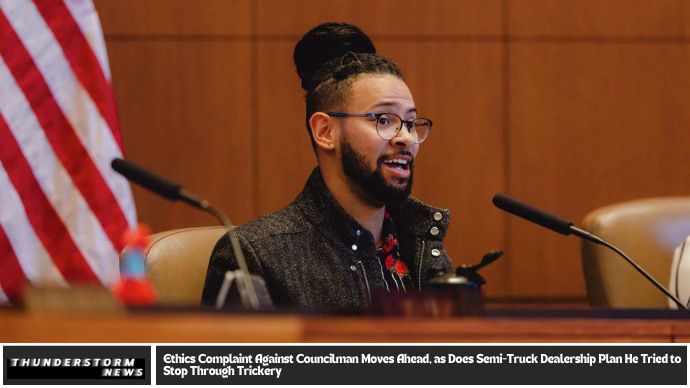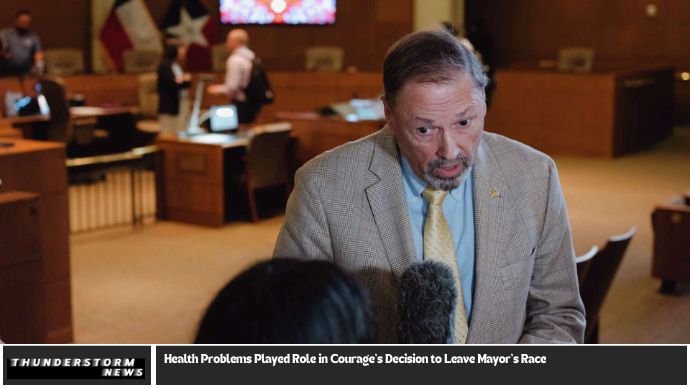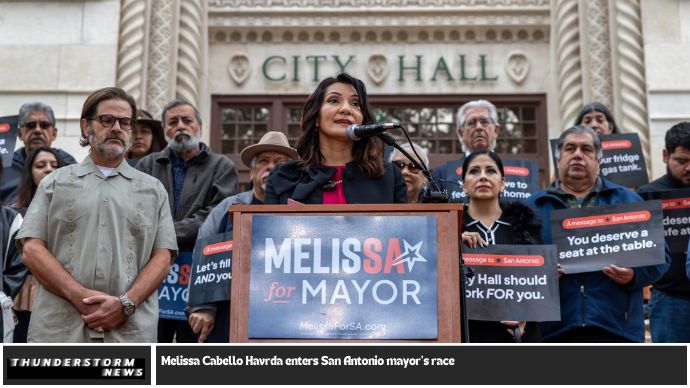An ethics complaint filed against a local councilman has taken a significant step forward as it gains momentum. The complaint alleges that the councilman engaged in unethical behavior by attempting to block a semi-truck dealership plan through deceitful tactics. This revelation has raised questions about the integrity of elected officials and their influence over business decisions. While the ethics investigation moves ahead, the semi-truck dealership project that the councilman tried to stop is also forging ahead, causing tensions within the local political and business communities.
In this blog post, we will dive deep into the details of the ethics complaint, examine the allegations against the councilman, and analyze how his actions could have long-term consequences on the local government’s trustworthiness. Additionally, we will explore the semi-truck dealership plan, its potential economic impact, and what this situation means for the relationship between elected officials and business development in the community.
The Alleged Ethics Violation: What Happened?
The ethics complaint against the councilman stems from accusations that he used deceitful methods to prevent the approval of a semi-truck dealership in his district. According to the complaint, the councilman attempted to derail the project by spreading misinformation, making false claims, and even applying political pressure to influence fellow council members. These actions allegedly amounted to a breach of ethical standards that public officials are expected to uphold.
While the councilman maintains his innocence, asserting that he was simply protecting the interests of his constituents, the investigation into his conduct is proceeding. The outcome of this complaint could have significant ramifications not just for the councilman, but also for the broader political landscape in the region.
Semi-Truck Dealership Plan: A Business Controversy
The semi-truck dealership plan at the center of this dispute has sparked a fierce debate within the community. Proponents argue that the dealership could bring much-needed economic growth, create jobs, and enhance the local business landscape. They contend that the project has been carefully designed to meet zoning requirements and is expected to boost the regional economy by attracting businesses related to the trucking industry.
On the other hand, opponents of the plan, including the councilman involved, argue that the dealership could harm the local environment and lead to traffic congestion. They claim that the area is not suitable for such a large-scale commercial enterprise. While the councilman’s attempt to block the plan may have been motivated by concerns for the community, the alleged use of trickery to sway the decision-making process has raised ethical questions.
The Role of Ethics in Local Government
Public trust is a fundamental pillar of any democratic system. Elected officials are expected to make decisions that serve the best interests of the public, and their actions should be transparent and free from personal or political gain. When council members fail to uphold these ethical standards, it can erode trust in the government and its institutions.
In this case, the councilman’s alleged attempts to manipulate the outcome of the semi-truck dealership plan through trickery are seen as a violation of the ethical standards that guide public officials. If proven true, these actions could lead to sanctions or even removal from office, further diminishing public confidence in the political process.
The Political Fallout: Impact on Local Politics
The ethics complaint and the controversy surrounding the councilman’s behavior are expected to have significant political implications. If the councilman is found to have acted unethically, it could damage his political career and lead to a loss of support from constituents. Moreover, the incident has the potential to spark broader discussions about the accountability of local politicians and the need for stricter oversight of government officials.
As the ethics investigation unfolds, it will likely influence public perception of the councilman and his ability to represent the interests of his district. Voters may become more skeptical of the councilman’s motives, and his credibility could be severely tarnished. The controversy also underscores the importance of ethical conduct in politics and the need for transparency in decision-making.
Economic Implications of the Semi-Truck Dealership Plan
While the ethics complaint against the councilman garners attention, the semi-truck dealership plan is moving forward. Despite the councilman’s efforts to stop it, the project’s proponents have successfully garnered the necessary support to proceed. This plan has the potential to bring significant economic benefits to the region, creating jobs, attracting investment, and expanding the local economy.
For those who support the project, the dealership represents a much-needed boost to the local business community. The trucking industry is vital to the nation’s economy, and establishing a dealership in the area would strengthen the region’s position as a logistics hub. By providing a location for semi-truck sales and servicing, the dealership could stimulate demand for related businesses, such as fuel stations, maintenance facilities, and even lodging for long-haul truckers.
However, the project also raises concerns about its environmental and infrastructural impact. Opponents of the plan argue that the dealership could increase traffic congestion, create pollution, and negatively affect the quality of life for residents. Despite these concerns, the project continues to progress, and it is likely that the debate will continue for months to come.
May you also like it:
Broomfield Students Pile Up Donations for Their Flooded Peers
UK Weather: Summer Ends with Intense Thunderstorms and Rain
How Tree Maintenance Can Prevent Storm Damage
FAQs
1. What is the ethics complaint against the councilman about?
The ethics complaint alleges that the councilman used deceitful tactics to try to block a semi-truck dealership plan, including spreading misinformation and exerting political pressure.
2. How is the semi-truck dealership plan related to the councilman’s actions?
The councilman allegedly attempted to stop the dealership project due to concerns about its impact on the local environment and infrastructure, although his tactics are being questioned as unethical.
3. What are the potential consequences for the councilman if the ethics complaint is upheld?
If the councilman is found to have acted unethically, he could face sanctions, a loss of public trust, and even removal from office, which could impact his political future.
4. What are the benefits of the semi-truck dealership project?
The dealership is expected to create jobs, stimulate economic growth, and strengthen the region’s position as a logistics hub, benefiting the local economy.
5. Why do some people oppose the dealership project?
Opponents argue that the dealership could lead to increased traffic congestion, environmental degradation, and a negative impact on the quality of life for nearby residents.
6. What does this controversy mean for the future of local politics?
The ethics complaint and the semi-truck dealership plan highlight the importance of transparency and ethical conduct in local government. They may spark broader discussions on accountability and the role of elected officials in shaping business development.
Conclusion
As the ethics complaint against the councilman moves forward, the community remains divided over the impact of his alleged actions and the future of the semi-truck dealership project. The situation underscores the complex relationship between local politics, business development, and ethics in decision-making. While the councilman’s career may be on the line, the dealership project continues to forge ahead, with its economic benefits and environmental concerns still at the forefront of the debate. As the investigation unfolds, the public will be watching closely to see how this conflict will shape the future of both local governance and business development in the region.







